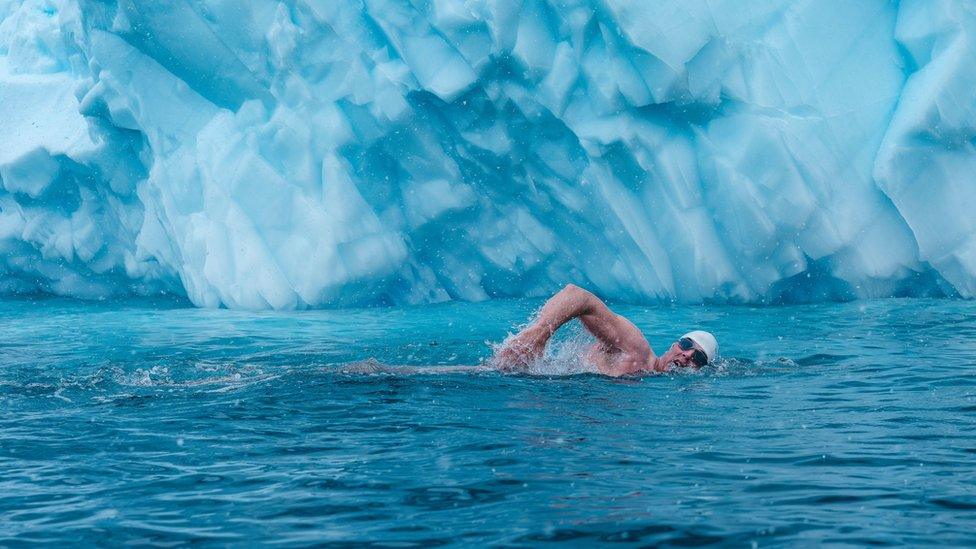Climate change: Swimmer plans 'coldest swim on Earth'
- Published
- comments

He's currently training in Iceland, before he finishes his training in Greenland
An endurance swimmer is planning to do what he's described as the coldest swim on Earth to highlight the impact of climate change on our planet.
Lewis Pugh is heading to Greenland, where he'll swim across the six-mile mouth of the Ilulissat Icefjord which is in front of the world's fastest-moving glacier.
The waters are VERY cold there, in fact they're almost frozen and there's a wind chill that can sink to negative numbers. Brrrrrrrrrrr!
It'll also be a longer route than just going in a straight line, as he needs to dodge around icebergs and floating fragments of ice known as 'brash ice'.
It is a Unesco World Heritage Site
On average it moves 30 metres per day
It produces 10% of Greenland's icebergs, some of which are over 1km (0.6 miles) tall and including - according to legend - the one that sank the Titanic.
The challenge is expected to take two weeks and start on 25 August. At the moment he's training in Iceland, before he'll move to finish his training in Greenland.
Lewis says it will be the world's first multi-day swim in the polar regions, as well as the coldest swim on Earth.
He added: "This swim will be the most challenging of my career. The cold-water adaptation and training alone is gruelling and extremely intense on the body.
"But there is a reason I'm doing this. We are an ice-dependent species. Ice keeps our planet cool enough for us to live. The polar regions and high-altitude glaciers are melting, and our collective survival is on the line."
Lewis Pugh is an endurance swimmer - this isn't his first challenging swim!
Lewis hopes to highlight the rapid melting in regions such as the Arctic which is happening because of climate change.
Lewis said: "What happens in the Arctic will determine the future of our planet and everything that lives on it.
"The polar regions are feeling the effects of the climate crisis more dramatically than anywhere else on Earth.
"If temperatures continue to increase, the polar ice caps will melt and sea levels will rise.
"Unless we take urgent action to decrease global temperatures by seriously lowering our global carbon dioxide emissions, low-lying islands and coastal cities will, quite literally, drown."
A lot of training is needed before the challenge
The devastation of the natural world will affect every single person, every future generation and every creature, great and small, on this planet.
This isn't his first epic swim though - in the past he's swum in the Arctic, the Antarctic, the Himalayas and up the English Channel - all to campaign for more to be done to protect the environment.
Once he finishes this challenge, he will be heading to Cop26 - a big summit in Glasgow where world leaders are coming together to discuss climate change and how to tackle it.
- Published6 January 2020
- Published20 January 2020
- Published3 March 2020
- Published24 January 2020
